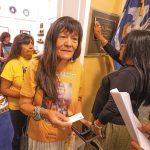
Virus robs families of rituals: Out of caskets, freezer space, funeral home scrambles to serve COVID-19 families
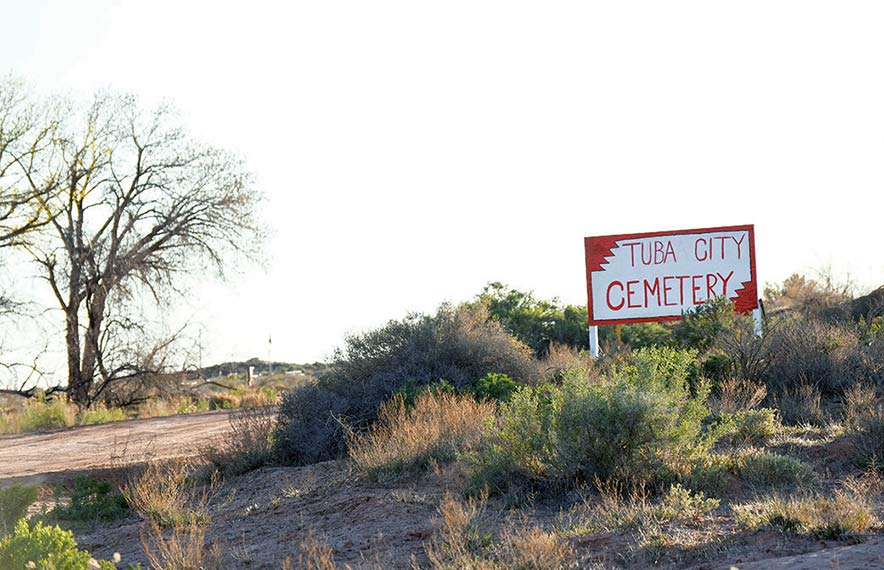
Special to the Times | Krista Allen
The Tuba City Cemetery is located just west of Tuba City Regional Health Care Corporation on Arizona Boulevard in Tónaneesdizí. As the coronavirus pandemic wears on, the Navajo Nation has seen the deaths of more than 30.
By Krista Allen
Special to the Times
DOOK’O’OOSŁÍÍD-KINŁÁNÍ AND TÓNANEESDIZÍ
Larry C. Welch moved through oil-fire darkness and death and saw the full fury of modern conventional firepower in the Persian Gulf War, during which, as a member of the 82nd Airborne Division, he helped expel occupying Iraqi forces from Kuwait and helped rout Saddam Hussein’s Republican Guard.
But he was no match for a microscopic enemy.
The U.S. Army veteran from Naatsis’áán would have been 60 years old on April 7. He died Tuesday, March 31, at 12:30 a.m. while hospitalized with the coronavirus at Flagstaff Medical Center.
Larry’s 82-year-old mother, Maryann, followed him the very next day on April 1.
“A few weeks ago, my family hosted a revival in Navajo Mountain, (where) there were some attendees who were sick,” said Thomasina Dinehdeal, Maryann’s granddaughter. “It is suspected that these people who were sick at my family’s revival attended the gathering that occurred in Chilchinbeto.”
As a public service, the Navajo Times is making all coverage of the coronavirus pandemic fully available on its website. Please support the Times by subscribing.
How to protect yourself and others.
Why masks work. Which masks are best.
Resources for coronavirus assistance
The Chilchinbeto gathering is suspected of starting the COVID outbreak on Western Navajo that has infected hundreds of people and claimed dozens of lives.
“My family welcomed the attendees by sharing hugs and handshakes with the members at the revival, unaware that the sick were possibly positive for COVID-19,” Dinehdeal recalled.
Fevers, body aches
The revival was at Maryann’s residence in Naatsis’áán, where she lived simply as a rancher. Larry lived in Tónaneesdizí but made frequent trips to Naatsis’áán to help his mother around the house and maintained her livestock.
“A week went by after the revival. My grandmother Maryann started to have fevers and body aches, so she went to the hospital in Tuba City where they just gave her medication,” Dinehdeal explained. “She went back home to Navajo Mountain with her son Larry to look after her.
“While in isolation, my grandmother started to have trouble breathing and her fever started to worsen, (then) she was admitted to (the Tuba City hospital on March 25).”
On March 27, Maryann was transferred to Flagstaff Medical Center, Arizona’s only Level I Trauma Center north of Maricopa County. Larry started showing symptoms of the coronavirus. Larry was admitted to Tuba City Regional on March 28 and then was transferred to FMC the following morning.
Dinehdeal said Maryann was given a COVID-19 test when her blood oxygen levels began to drop at Tuba City Regional. Her test came back positive while she was at FMC.
“When my uncle was having these symptoms, we made sure (he) was (taken) to the hospital,” Dinehdeal said. “My grandmother not only hosted clothing and food drives for those in need, she provided church service and prayer meetings. My uncle was an advocate for (military) veterans and made sure to attend meetings.”
The Navajo Epidemiology Center reported Monday a total of 813 COVID-19 cases and 28 deaths in the Navajo Nation. But the coronavirus has taken far more than lives, according to Valley Ridge Mortuary in Tónaneesdizí.
On Monday, the death toll in Navajo Nation topped 31, according to Navajo Times’s tally.
How Diné families grieve, often by a large gathering to celebrate a life, is changing during the coronavirus outbreak.
The virus has robbed Diné families of the rituals that follow death. Funeral services at churches have been suspended by social distancing orders to help slow the spread of the disease.
But if funeral services happen at all, they are limited to a handful of immediate family members, said Michael Begay, the funeral director and the owner of Valley Ridge Mortuary.
“It’s been a real challenge over the past weeks,” said Begay, a retired criminal investigator for Tuba City Police District. “Primarily, we have such an influx of bodies – more than we normally deal with.”
Influx of cases
Begay, who’s also an embalmer, started making phone calls and reached out to the Navajo Nation Incident Command Post, Coconino County Emergency Management and Tónaneesdizí Chapter for help when he and his staff were confronted with a lack of freezer storage and with dire shortage of masks, gowns and eye gear to protect themselves from the virus.
Begay said obtained a semi-trailer, which will be converted to a freezer for the mortuary. With the death toll from the virus growing each day, the Valley Ridge Mortuary staff is scrambling.
“Right now, we’re really trying to adjust to the amount of cases we’re receiving,” Begay said. “In fact, it almost seems like there’s a second wave coming.
“We went through a first wave of bodies and dealing with families and burials and such,” he said, “and then we had a little break for about three days.”
On April 11, staff picked up six bodies. Bodies come from homes and hospitals, including from Flagstaff and Phoenix.
“I think the reason why we’re getting this influx is because our area –– we’re in the hot spot here in Western Navajo and we cover Kayenta, Tuba City, and a lot of our cases are coming out of Flagstaff Medical Center,” Begay said. “There’s a lot of cases we have that have the symptoms and of course, they weren’t tested.
“We’ve gotten bodies from individuals’ homes … and of course they also had symptoms,” Begay said. “And unfortunately, there’s also a number of family members from one family that we’re getting, too. We’ve gone through that with three different families right now.”
Front-line health care workers at FMC said they are working closely with the epidemiologist in each Arizona county to make sure the collection of data is accurate.
“We’re also working in conjunction with the medical examiner (in each county) around these cases,” said Dr. Derek Feuquay, the chief medical officer for FMC.
Burial assistance
A standard burial with a casket – including memorial service and transport fees – ranges in cost from $3,200 to $3,500, while a standard cremation is about $1,795, said Begay.
“Eighty percent of our families here utilize the burial assistance,” he said. “The Navajo Nation offers $2,500 for a standard burial with a casket. As far as cremation, again, the Navajo Nation does cover some of the expenses.
“And then we do traditional burials without a casket,” he said. “We’ve had two of those so far, but we do want the body inside a container and not just wrapped in blankets. We do build a container for that. That’s 80 percent of our business right now, is the Navajo Nation.”
Because funeral costs can be high, the Navajo Nation Division of Social Services established the COVID-19 burial assistance to help with the financial toll on Diné families.
“I know that’s another reason we have such high numbers,” Begay said. “We’ve had to make adjustments in the types of services we do. We’ve gone through quite a bit of cases and most families are understanding our situation and I’ve made some adjustments such as being very careful in how I do services –– not only myself but also my staff.
“One thing I’m really concerned about is if I go down, not only will this business cease to operate, who’s going to help these families out here?” he asked. “That’s one of my biggest concerns and I’m really careful, trying to keep myself healthy and keep my staff healthy.”
Begay said he’s limited the number of people who visit his office, allowing only one or two healthy people from each family to take care of arrangements. He’s also hired contract workers to deep clean his office twice a week. On other days, he and his staff disinfect the office themselves.
“So they’re all gravesite services and we tell the families to limit the number of people as the guidelines from the (Centers for Disease Control and Prevention), of 10 or less,” Begay explained. “We’ve actually had two services where there was nobody there. Just one person and our staff ended up having to refill the grave.
“And right now, my staff – they’re dealing with it,” he said. “They themselves are feeling the strain. I, myself, have been feeling the strain because it’s a bit overwhelming. I’m trying to deal with all of this.
“In fact, just (last week), we did 12 burials and five cremations,” he said. “And that’s really a high number for us. We don’t encounter that on a normal work schedule, a normal week.”
Coronavirus demand
Some Diné families are turning to crowdfunding to cover coronavirus-related funeral costs. Between mid-March and early April, the number of virus-related campaigns on GoFundMe seems to have shot up.
The stories told on those fundraising pages convey grieving Diné families facing costs for funerals.
“Raising money for funeral expenses for my dad …. He reunited with my mom on April 11, 2020. He lost his battle for COVID-19,” reads a campaign, which raised a total of $300 of a $1,000 goal as of April 14.
“As you all know, we lost our gal … on Saturday, April 11, 2020, to COVID-19. We’re asking for any help of donations to bring her back home as the family prepares for her funeral arrangement. She fought extremely hard for several weeks against this nasty virus that is hurting us all on our Navajo land and across the world. We know this is trying times, but anything helps,” reads another campaign, which raised a total of $3,130 of a $9,000 goal as of April 14.
“I am raising money due to current events around this COVID-19 pandemic. We recently lost my uncle … to COVID-19 on Tuesday, April 7, 2020, his family now is in a financial burden, they lack household necessities we all need in times like this to keep sanitary, and food,” reads another campaign, which raised a total of $310 of a $2,500 goal.
Begay said one family who lost their loved one to the virus came into the mortuary with money they raised on GoFundMe and because they did that, they weren’t able to use the Navajo Nation COVID-19 burial assistance.
“Something new that came up with (Division of) Social Services is that they’re processing payments in a different manner,” Begay said. “There were some general funds approved for direct payments of COVID-19 cases. And this one family in particular thought, since their loved one died from COVID-19, they could use those general funds. But you still have to go through the same approval process with (Navajo Family Assistance Services).”
The criteria for burial assistance are: the decedent must be a member of the Navajo Nation with an enrolled census number; and the decedent must have died from COVID-19 as verified by the appropriate authority.
The burial assistance process is as follows: A family member must contact a DSS-contracted mortuary – such as Valley Ridge Mortuary and Desert View Funeral Home in Shiprock – and request the Navajo Nation COVID-19 burial assistance; inform the mortuary of choice for type of service (standard burial, a casket and services; Native traditional burial, no casket; or cremation); and finally the mortuary will submit the documents directly to DSS’s Navajo Family Assistance Services.
For questions, contact Navajo Family Assistance Services at 866-347-2403.
‘This is very serious’
“With general funds money, it should be a lot quicker,” Begay said. “And that helps me because I actually ran out of caskets this week. I was kind of caught where I couldn’t offer burial assistance because I didn’t have caskets.
“The way it’s set up is I have to carry the debt until I do get paid,” he said. “And I have to buy more caskets and that puts a strain on my operations here.
“So, with this general fund money, this week will be the first time we’ll be utilizing it, so we’ll see how that goes,” he said.
More than 23,000 people have died in the U.S. coronavirus outbreak, according to the John Hopkins coronavirus database. And all those deaths will require a final rite.
“I really feel for the families that are going through this, especially the ones that we had to – last week it was mother and son that both died from the virus, and I see it,” Begay said. “It’s within the family. To lose a mother and a son at the same time, that’s hard.”
In fact, there are at least three sets of Diné mothers and sons who died, according to Navajo Times research.
“My advice to people out there is to take it seriously. This is serious,” Begay added. “And all the memes and joking aside, this is very serious.
‘People don’t realize it is very deadly and we have to really get down and do what is being advised by the government and the CDC – social distancing and washing your hands, wearing your mask and gloves, and staying home,” he said. “That’s a big part of it – not to be out and about.
“It’s everywhere and you’re going to bring that virus back home and infect your whole family,” he said, “and that’s happening.”

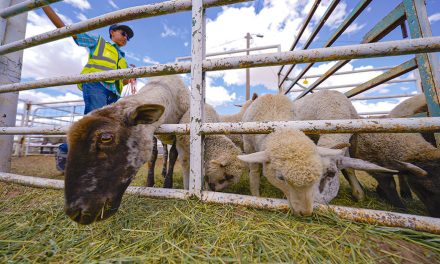
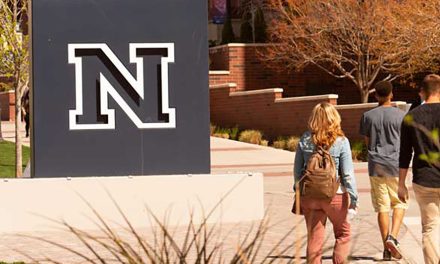

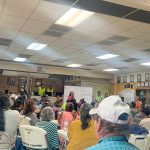



 Highway 264,
Highway 264, I-40, WB @ Winslow
I-40, WB @ Winslow